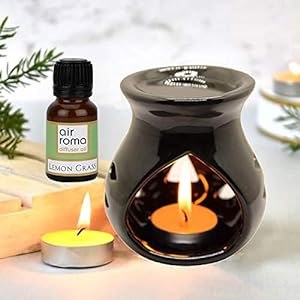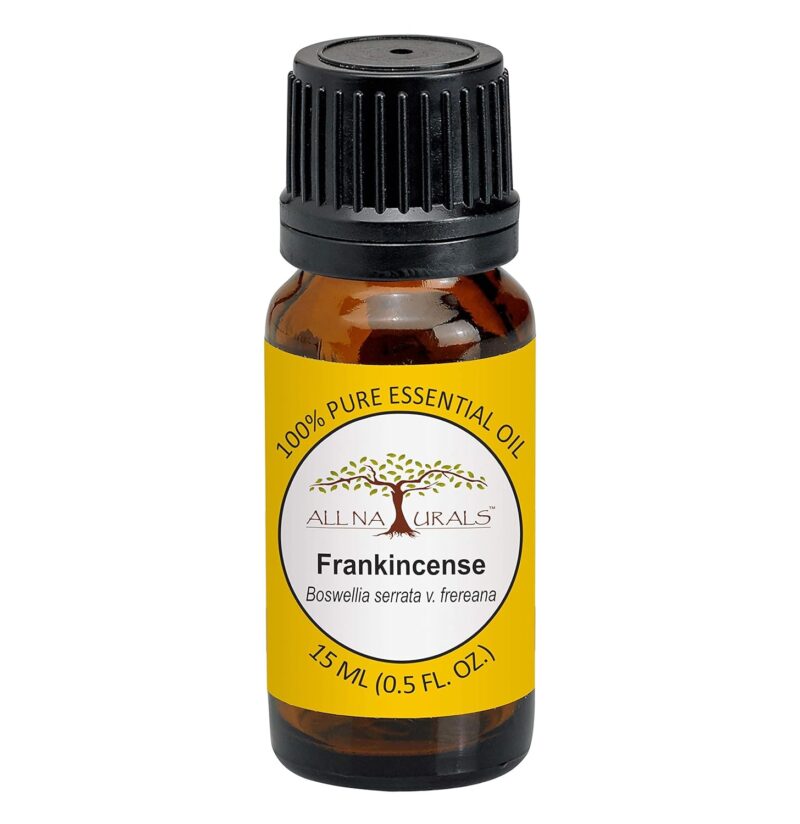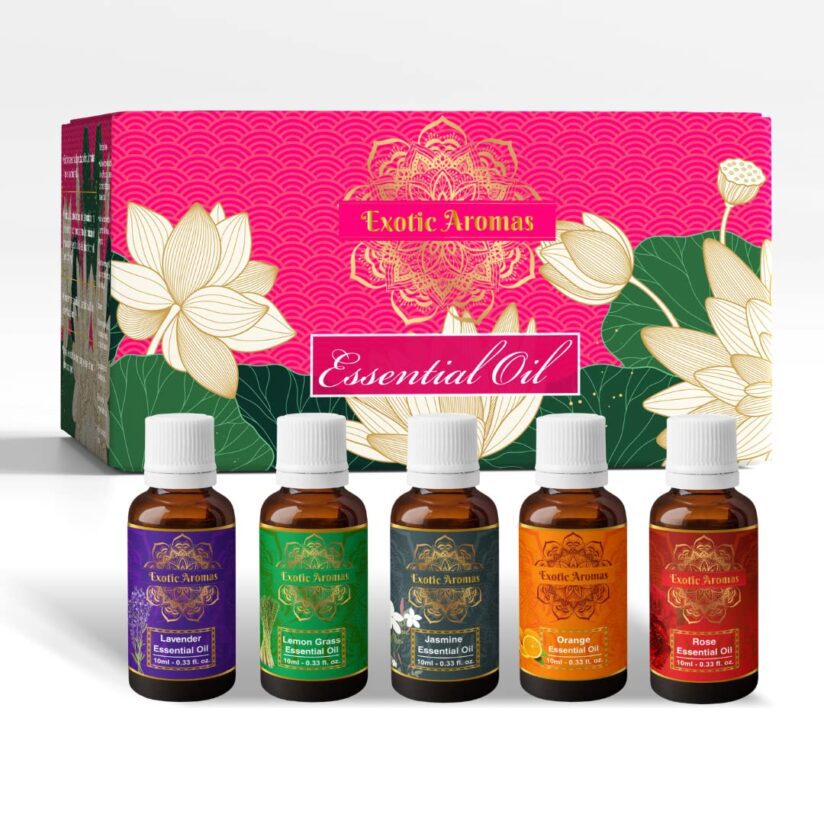Introduction:
Aromatherapy is a holistic healing practice that utilizes natural plant extracts, known as essential oils, to promote physical, mental, and emotional well-being. These essential oils are derived from various parts of plants, such as flowers, leaves, stems, bark, or roots, and are believed to have therapeutic properties.https://amzn.eu/d/cEqT0eu
Table of Contents

How Aromatherapy Works to Calm the Mind and Relieve Stress:
- Olfactory System: Aromatherapy primarily works through the sense of smell. When you inhale the aroma of essential oils, the olfactory system in your nose sends signals to the limbic system in the brain. The limbic system is associated with emotions, memories, and arousal, making it a key player in regulating mood and stress responses.
- Chemical Components: Essential oils contain natural compounds that can have a direct impact on the body. For example, certain compounds may trigger the release of neurotransmitters like serotonin, which is associated with mood regulation. Others may have anti-anxiety or calming effects.
- Absorption: In addition to inhalation, essential oils can be absorbed through the skin during massage or when added to bathwater. This allows the oils to enter the bloodstream and circulate throughout the body, potentially influencing various physiological functions.
Theory of Enlightenment with Different Aromas: While there isn’t a scientific theory directly linking aromatherapy to enlightenment, some people believe that certain aromas can enhance spiritual practices or meditation.
For example:

Frankincense and Myrrh: These essential oils are often associated with religious and spiritual rituals. Some believe that their use can create a sacred atmosphere and enhance meditation or prayer.
Different Types of Aromas and Their Benefits on the Human Mind:

- Lavender: Known for its calming properties, lavender is often used to reduce anxiety, promote relaxation, and improve sleep quality.
- Peppermint: Invigorating and refreshing, peppermint is believed to enhance alertness, focus, and mental clarity. It may also help relieve headaches.
- Chamomile: With its mild and soothing scent, chamomile is commonly used to promote relaxation and alleviate stress. It can be particularly beneficial before bedtime.
- Citrus Oils (e.g., Orange, Lemon, Grapefruit): These oils are uplifting and energizing, helping to combat feelings of lethargy and boost mood.
- Eucalyptus: Known for its respiratory benefits, eucalyptus can clear the mind and improve concentration. It is often used during times of sickness to alleviate congestion.
- Rosemary: This herbaceous aroma is associated with improved memory and concentration. It can be helpful during study or work sessions.
Aromatherapy for Relationship between Partners:
Aromatherapy, the use of essential oils to promote physical and psychological well-being, can offer several benefits to couples. While individual experiences may vary, here are some ways in which aromatherapy can enhance the relationship between partners:
- Stress Reduction: Certain essential oils, such as lavender, chamomile, and bergamot, are known for their calming properties. By using these scents, couples can create a relaxing environment that helps reduce stress levels. Lower stress can contribute to better communication and a more harmonious relationship.
- Enhanced Relaxation: Aromatherapy can promote relaxation, helping both partners unwind after a long day. Oils like lavender and eucalyptus can be diffused or added to a bath, creating a soothing atmosphere that encourages relaxation and intimacy.
- Improved Sleep Quality: Essential oils like lavender and chamomile are known for their sleep-inducing effects. Diffusing these scents in the bedroom can contribute to a more restful night’s sleep, leaving both partners feeling more refreshed and connected.
- Increased Sensuality: Certain essential oils, such as ylang-ylang and jasmine, are believed to have aphrodisiac properties. Incorporating these scents into the environment or using them in massage oils can help create a more sensual atmosphere, fostering intimacy between partners.
- Communication Enhancement: Aromatherapy can stimulate the senses and create a positive atmosphere. Scents like citrus or peppermint can be invigorating and may help improve focus and communication, allowing for more effective and positive interactions between partners.
- Shared Rituals: Engaging in aromatherapy together can become a shared ritual for couples. Whether it’s diffusing oils, giving each other massages with scented oils, or enjoying a relaxing bath together, these activities can strengthen the bond between partners and provide opportunities for quality time.
- Emotional Connection: Certain scents can evoke memories and emotions. By choosing scents that hold personal significance or are associated with positive experiences, couples can create a deeper emotional connection and reinforce positive feelings within the relationship.
- Mood Enhancement: Aromatherapy can influence mood, and certain scents are known to lift spirits and promote a positive atmosphere. Oils like citrus, peppermint, or rosemary can be used to boost energy and create a cheerful environment for couples to enjoy together.
It’s important to note that individual preferences and reactions to scents can vary, so it’s advisable for couples to explore different essential oils together and find what works best for them. Additionally, seeking professional advice on proper usage and potential contraindications is recommended before incorporating aromatherapy into daily routines.
Different Aromas for creating Romantic Ambience
Certain aromas are believed to have the potential to enhance mood and create a more intimate atmosphere between couples. While individual preferences vary, here are some aromas that are commonly associated with promoting a positive and romantic ambiance:
- Ylang Ylang: Known for its exotic and floral scent, ylang-ylang is often considered an aphrodisiac. It is believed to have relaxing properties that can help reduce stress and promote a sensual atmosphere.
- Rose: The classic scent of roses is often associated with love and romance. It has a sweet and floral aroma that may evoke feelings of affection and intimacy.
- Jasmine: Jasmine has a rich, sweet fragrance that is thought to have mood-enhancing and aphrodisiac qualities. It can create a soothing and romantic ambiance.
- Sandalwood: With its warm and woody aroma, sandalwood is believed to have grounding and calming effects. It’s often used to promote a sense of relaxation and intimacy.
- Patchouli: This earthy and musky scent is sometimes associated with passion. It’s believed to have a grounding effect and may help create a sensual atmosphere.
- Vanilla: The sweet and comforting scent of vanilla is often considered warm and inviting. It may evoke feelings of happiness and relaxation, contributing to a positive mood between couples.
- Cinnamon: The spicy and warming aroma of cinnamon is thought to be stimulating and may create a cozy and intimate atmosphere.
Creating a romantic environment with aromas is just one aspect; communication, emotional connection, and mutual understanding are essential components of fostering intimacy between couples.
Conclusion:
It’s important to note that individual responses to aromas can vary, and the effectiveness of aromatherapy may be influenced by personal preferences and associations. While aromatherapy can be a complementary approach to relaxation and stress relief, it’s not a substitute for professional medical or psychological treatment when needed.
Frequently Asked Questions:
Q1: What is aromatherapy? Aromatherapy is a holistic healing practice that involves the use of essential oils extracted from plants to promote physical, mental, and emotional well-being. These essential oils are often inhaled, applied topically, or used in other methods to harness their therapeutic properties.
Q2: How does aromatherapy work? Aromatherapy works through the inhalation of aromatic compounds found in essential oils. When inhaled, these compounds can stimulate the olfactory system, influencing the brain’s limbic system, which is associated with emotions, memory, and certain physiological functions.
Q3: What are essential oils? Essential oils are concentrated liquids containing volatile aroma compounds from plants. They are extracted through methods such as steam distillation or cold pressing. Each essential oil possesses unique therapeutic properties and scents.
Q4: What are common essential oils used in aromatherapy? Common essential oils include lavender (calming), peppermint (invigorating), eucalyptus (clearing), tea tree (antimicrobial), and chamomile (soothing). The selection depends on the desired effect and individual preferences.
Q5: How can aromatherapy be applied? Aromatherapy can be applied through various methods, including inhalation (diffusers, steam inhalation), topical application (massage, baths, compresses), and in some cases, ingestion (under professional guidance). The chosen method depends on the specific goals and preferences of the individual.
Q6: What are the benefits of aromatherapy? Aromatherapy can offer various benefits, such as stress reduction, improved mood, relaxation, enhanced sleep quality, and support for overall well-being. It can also be used to address specific concerns like headaches, muscle tension, or respiratory issues.
Q7: Can aromatherapy be used for specific health conditions? Aromatherapy is often used as a complementary approach to support general well-being. While it may offer relief for certain conditions like anxiety or headaches, it’s essential to consult with a healthcare professional for specific health concerns.
Q8: Are there any safety considerations with aromatherapy? Yes, safety considerations include potential allergic reactions, skin sensitivity, and the need to dilute certain essential oils before applying them topically. Pregnant women, individuals with certain medical conditions, and pets may have specific considerations, so it’s advisable to seek professional guidance.
Q9: Can aromatherapy be used by everyone? In general, aromatherapy is considered safe for many people when used appropriately. However, individual sensitivities vary. Pregnant women, individuals with allergies, respiratory issues, or certain medical conditions should seek advice from a healthcare professional before using aromatherapy.
Q10: How do I choose the right essential oil for me? Choosing the right essential oil depends on your desired effect and personal preferences. Experimenting with different scents and observing how they make you feel can help you identify the oils that work best for you. It’s also helpful to seek guidance from aromatherapy professionals or resources.
Links to connect with me:
My Website: http://www.positiveworldcounselling.in
My Facebook page: https://www.facebook.com/pwcc38/
My Linked in: https://in.linkedin.com/in/sarita-saini-31150017
My Instagram: https://www.instagram.com/positiveworld2632/
